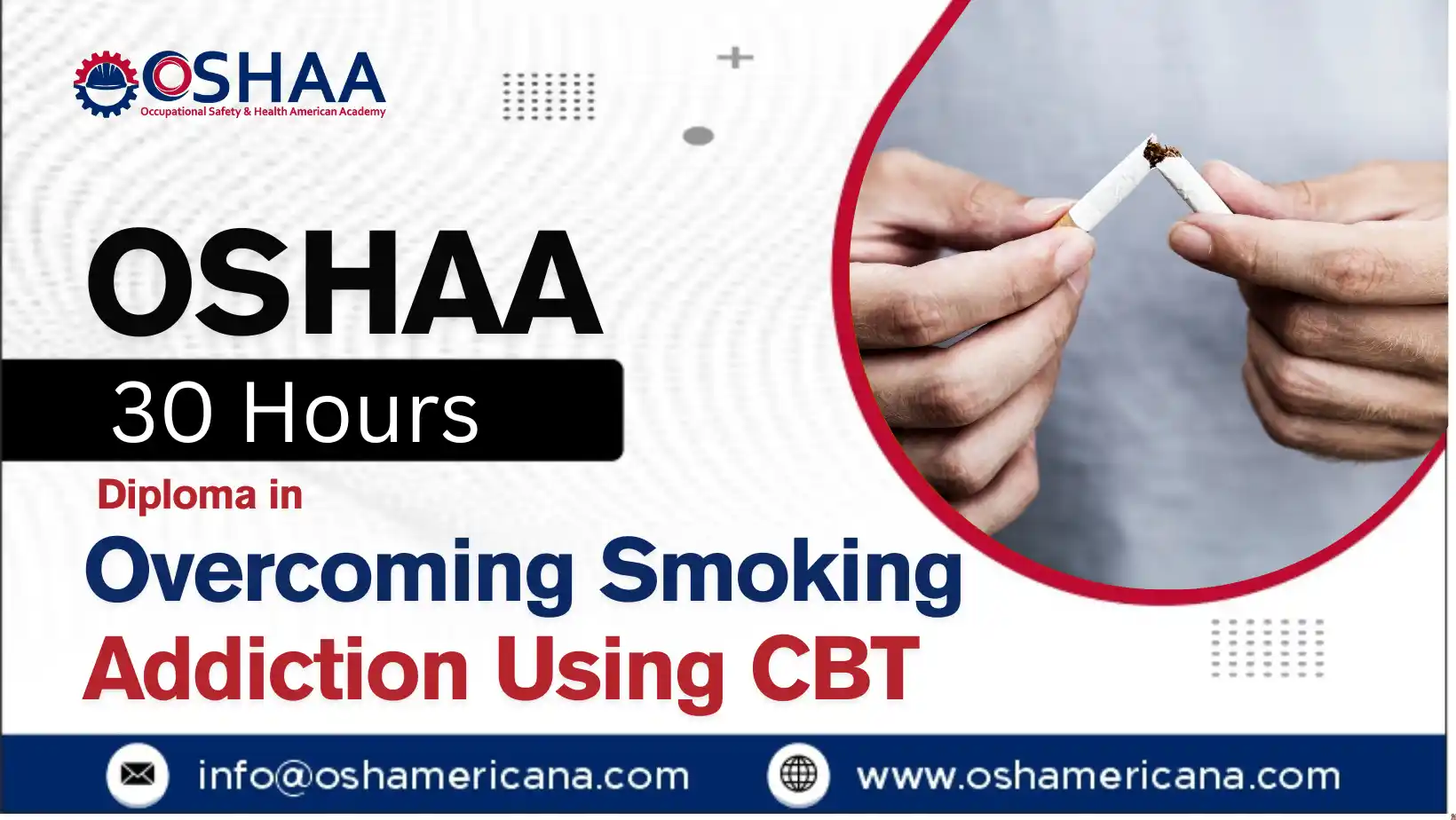Smoking remains one of the most challenging addictions to overcome, with physical, psychological, and behavioural factors intertwined. The OSHAA 30-Hours Diploma in Overcoming Smoking Addiction Using Cognitive Behavioural Therapy (CBT) offers a comprehensive and evidence-based pathway to help individuals understand and manage their smoking habits effectively.
Cognitive Behavioural Therapy is a structured, time-limited, and goal-oriented approach to addressing maladaptive thinking patterns and behaviours. CBT is widely recognised for its effectiveness in treating various forms of addiction, including smoking. Through this diploma, participants will explore the connection between thoughts, triggers, cravings, and behaviour, empowering individuals to take control of their addiction through structured strategies and interventions.
The OSHAA 30-Hours Diploma in Overcoming Smoking Addiction Using CBT delivers both theoretical understanding and hands-on techniques. It introduces the foundations of CBT, followed by practical application tailored specifically to smoking cessation. Each module focuses on skill development, self-awareness, and relapse prevention planning.
The OSHAA 30-Hours Diploma in Overcoming Smoking Addiction Using CBT is a valuable qualification for anyone seeking a structured, effective, and supportive approach to breaking free from nicotine dependence. With a focus on sustainable change, self-awareness, and psychological resilience, this programme empowers individuals to lead healthier, smoke-free lives.
OSHAA 30-Hours Diploma in Overcoming Smoking Addiction Using CBT
Study Units
Learning Outcomes
Introduction to Smoking Addiction and Behavioural Psychology (3 Hours)
- Understand the psychological, physiological, and behavioural components of smoking addiction
- Recognise the stages of addiction and readiness to change
- Explore behavioural theories relevant to addictive habits and smoking cessation
Fundamentals of Cognitive Behavioural Therapy (CBT) (4 Hours)
- Understand the core principles and structure of CBT
- Identify how thoughts, emotions, and behaviours interact in the context of addiction
- Apply the CBT model to identify and challenge negative thinking patterns related to smoking
Identifying Triggers, Thoughts, and Cravings (4 Hours)
- Recognise personal and environmental smoking triggers
- Track and analyse cravings and high-risk situations
- Develop insight into automatic thoughts and habitual responses
Cognitive Restructuring and Managing Urges (5 Hours)
- Learn techniques to challenge irrational beliefs and cognitive distortions
- Practise thought substitution and reframing exercises
- Apply strategies for managing cravings and delaying responses to urges
Behavioural Activation and Habit Replacement Strategies (3 Hours)
- Explore alternative behaviours to replace smoking habits
- Implement activity scheduling to support positive behavioural change
- Identify reinforcing, healthy behaviours aligned with personal goals
Emotional Regulation and Stress Management Techniques (5 Hours)
- Develop skills to manage stress, anxiety, and emotional triggers without smoking
- Practise mindfulness, breathing exercises, and relaxation techniques
- Enhance emotional awareness and coping strategies in high-stress situations
Developing a Personalised Quit Plan Using CBT Principles (4 Hours)
- Create an individualised cessation plan based on CBT frameworks
- Set realistic, achievable goals and monitor progress
- Identify support systems and accountability mechanisms
Building Motivation and Self-Efficacy (2 Hours)
- Strengthen intrinsic motivation and commitment to quit smoking
- Understand the role of self-belief in behaviour change
- Practise techniques to build resilience and maintain long-term success
- Gain in-depth understanding of the psychological mechanisms behind smoking addiction and how to effectively address them using evidence-based methods
- Learn practical Cognitive Behavioural Therapy (CBT) techniques that support sustainable smoking cessation
- Develop personalised intervention strategies that can be applied in real-life scenarios to manage cravings and prevent relapse
- Improve emotional regulation and stress management skills to reduce dependence on smoking as a coping mechanism
- Enhance your ability to identify behavioural triggers and restructure negative thought patterns
- Build greater self-awareness, motivation, and confidence in your ability to quit smoking permanently
- Acquire transferable skills that can support wider health and wellbeing goals or professional practice
- Receive a professional-level qualification that adds value for those working in health, counselling, addiction support, or coaching
- Benefit from a structured, flexible learning experience tailored to both personal growth and career advancement
- Join a growing community of participants committed to promoting healthier lifestyles and evidence-based mental health practices
- Individuals who are actively trying to quit smoking and seeking structured, evidence-based support
- Former smokers who wish to strengthen their relapse prevention strategies and maintain long-term abstinence
- Mental health professionals, counsellors, and coaches looking to expand their knowledge of CBT techniques for addiction treatment
- Healthcare workers, wellness practitioners, and smoking cessation advisors aiming to support clients more effectively
- Students or graduates in psychology, health sciences, or social care interested in practical applications of behavioural therapy
- Employers or HR professionals developing workplace wellness programmes around addiction recovery
- Anyone interested in improving their understanding of behaviour change, motivation, and self-regulation through the lens of CBT
- Supportive family members or carers of individuals struggling with nicotine addiction who want to offer informed guidance







